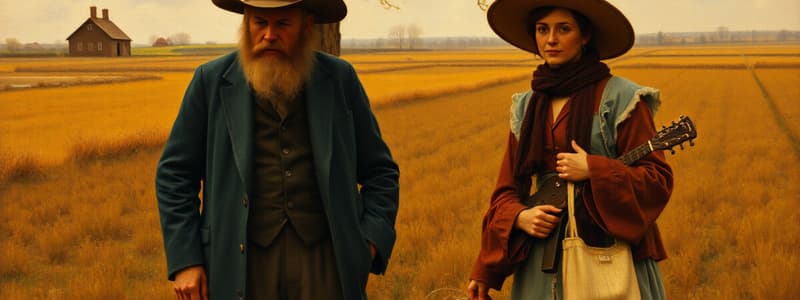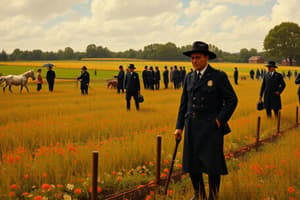Podcast
Questions and Answers
What was a key aim of the Populist Party during the Gilded Age?
What was a key aim of the Populist Party during the Gilded Age?
- The establishment of a gold standard
- The elimination of income taxes
- The introduction of agricultural subsidies
- The free coinage of silver (correct)
Which movement preceded the formation of the Populist Party?
Which movement preceded the formation of the Populist Party?
- The Labor movement
- The Granger movement (correct)
- The Progressive movement
- The New Deal
What was the outcome of the Supreme Court case in 1886 regarding the Granger laws?
What was the outcome of the Supreme Court case in 1886 regarding the Granger laws?
- The laws were expanded to include more protections
- The laws were upheld, benefiting farmers
- The laws were declared unconstitutional (correct)
- The laws were modified to limit their scope
Who was the Populist candidate in the 1892 presidential election?
Who was the Populist candidate in the 1892 presidential election?
What major political change occurred with the Democratic candidate in the 1896 election?
What major political change occurred with the Democratic candidate in the 1896 election?
Flashcards are hidden until you start studying
Study Notes
Political and Economic Context for Farmers
- American farmers experienced severe challenges during the Gilded Age, marked by political neglect and economic decline.
- Federal policies primarily favored industrial interests, adversely impacting agricultural pricing.
- Global economic factors contributed to falling prices, exacerbating farmers' struggles.
Emergence of Farmer Organizations
- Farmers initially united through the Granger movement, which aimed at addressing local agricultural issues.
- The movement evolved into Farmers' Alliances, focusing on political activism to combat monopolistic railroad pricing and unfavorable government policies.
Granger Laws and Legal Challenges
- Granger laws sought to regulate railroad rates and practices at the state level to support farmers.
- A significant Supreme Court case in 1886 invalidated these laws, prompting a shift in strategy toward national reform.
Formation and Goals of the Populist Party
- In response to ongoing hardships, farmers established the Populist Party to advocate for widespread reform.
- Key goals included the free coinage of silver to inflate currency, a graduated income tax, and the direct election of senators.
Impact of the 1892 Presidential Election
- James Weaver was the Populist Party's presidential candidate in 1892, securing over 8% of the popular vote, signaling the Party's growing influence.
- Weaver's candidacy highlighted farmers' concerns and brought their issues into the national political conversation.
1896 Election and Decline of the Populist Movement
- The 1896 presidential election saw Democratic candidate William Jennings Bryan adopt the free silver platform, which attracted Populist support.
- Bryan's nomination effectively marked the decline of the Populist movement, as their agenda was subsumed by the Democratic Party.
Studying That Suits You
Use AI to generate personalized quizzes and flashcards to suit your learning preferences.




